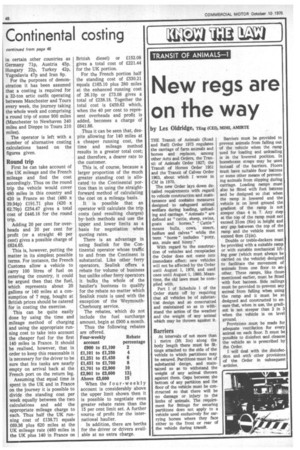Continental costing
Page 50

If you've noticed an error in this article please click here to report it so we can fix it.
continued from page 46
in certain other countries as Germany 71p, Austria 45p, Hungary 22p, Turkey 42p, Yugoslavia 47p and Iran 8p.
For the purposes of demonstration it has been assumed that a costing is required for a 32-ton artic outfit operating between Manchester and Tours every week, the journey taking the whole week and comprising a round trip of some 900 miles (Manchester to Newhaven 240 miles and Dieppe to Tours 210 miles).
The operator is left with a number of alternative costing calculations based on the figures given.
Round trip
First he can take account of the UK mileage and the French mileage and find the cost accordingly. Thus on the round trip the vehicle would cover 480 miles in this country and 420 in France so that (480 x 39.94p) £191.71 plus (420 x 62.79p) £254.47 gives a total cost of £446.18 for the round trip.
Adding 20 per cent for overheads and 20 per cent for profit (or a straight 40 per cent) gives a possible charge of £624.65.
This is, however, putting the matter in its simplest possible terms. For instance, the French Customs allow a vehicle to carry 100 litres of fuel on entering the country, it could be argued then that the fuel, which represents about 20 gallons or 140 miles at a consumption of 7 mpg, bought at British prices should be catered for in costing the exercise.
This can be quite easily done by using the time and mileage method of charging and using the appropriate running cost to take into account the cheaper fuel for the first 140 miles in France. It should be realised, however, that in order to keep this reasonable it is necessary for the driver to be sure that his tanks are nearly • empty on arrival back at the French port on the return leg.
Assuming that equal time is spent in the UK and in France on the journey it is possible to divide the standing cost per week equally between the two calculations and add the appropriate mileage charge to each. Thus half the UK running cost of £138.71 equals £69.36 plus 620 miles at the UK mileage rate (480 miles in the UK plus 140 in France on British diesel) or £152.08 gives a total cost of £221.44 for the UK portion.
For the French portion half the standing cost of £330.21 equals £165.10 plus 280 miles at the enhanced running cost of 26.10p or £73.08 gives a total of £238.18. Together the total cost is £459.62 which, when the 40 per cent to represent overheads and profit is added, becomes a charge of £641.86.
Thus it can be seen that, despite allowing for 140 miles at a cheaper running cost, the time and mileage method results in a greater total cost; and therefore, a dearer rate to the customer.
This is, of course, because a larger proportion of the much greater standing cost is allocated to the Continental portion than in using the straightforward method of calculating the cost on a mileage basis.
It is possible that an operator will calculate the trip costs (and resulting charges) by both methods and use the upper and lower limits as a basis for negotiation when quoting rates.
There is an advantage in using Sealink for the Continental operator whose traffic to and from the Continent is substantial. Like other ferry operators, Sealink offers a rebate for volume of business but unlike other ferry operators it bulks the whole of the haulier's business to qualify for the rebate no matter which Sealink route is used with the exception of the WeymouthCherbourg service.
The rebates, which do not include the fuel surcharge amount, begin at £900 a month.
Thus the following rebates When the f our-weekly account is considerably above the upper limit shown then it is possible to negotiate even greater rebate rates than the 15 per cent limit set. A further source of profit for the international haulier.
In addition, there are berths for the driver or drivers available at no extra charge.




































































































































